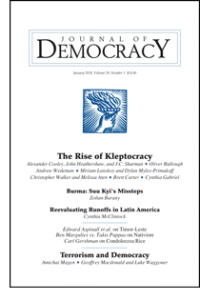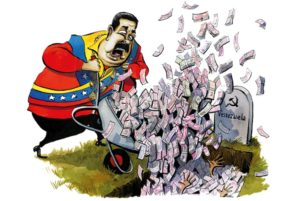
Hudson
Certain elements within the legal, financial, and influence communities, seeking new markets, clients, and profits among an emerging global class of super wealthy actors with fortunes of dubious provenance, have in the past fifteen years begun offering their services to transnational kleptocrats linked to authoritarian regimes, according to a new report.
From Washington lobbyists with Kremlin-linked accounts to New York law firms with Chinese Communist apparatchik clients, these tie-ups have a detrimental effect on the political and the financial workings of American democracy—one that is only growing, analysts Ben Judah and Nate Sibley contend in a new Hudson Institute report – The Enablers: How Western Professionals Import Corruption and Strengthen Authoritarianism – arguing that these professionals have become enablers of authoritarian influence within democracies in a twofold manner:
 First, they are facilitating the concealment, insertion, and deployment of kleptocrats’ illicit funds within Western economies.
First, they are facilitating the concealment, insertion, and deployment of kleptocrats’ illicit funds within Western economies. - Second, they are using their skills and expertise to help kleptocrats establish networks of influence inside democratic societies. This relationship between Western professionals and authoritarian elites has not only fueled a boom in money laundering; it has transformed significant elements of the most distinguished, influential professions into wholesale importers of transnational corruption.
The United States, especially in concert with Europe and Japan, still has the international financial and economic power to address the globalization of oligarchy and kleptocracy, argues Daniel Nexon, an Associate Professor of Government and Foreign Service at Georgetown University.
 The United States should also support and help expand anti-kleptocracy measures in the United Kingdom and other Western ally governments, such as the freezing of financial assets through “unexplained wealth orders” of individuals who attempt to launder dirty money within Western financial systems, he writes for Foreign Affairs:
The United States should also support and help expand anti-kleptocracy measures in the United Kingdom and other Western ally governments, such as the freezing of financial assets through “unexplained wealth orders” of individuals who attempt to launder dirty money within Western financial systems, he writes for Foreign Affairs:
Clamping down on global grand corruption is an agenda very much in the jurisdiction of the United States and its democratic allies. Ultimately, transnational oligarchy requires multilateral solutions, and these will not come about without U.S. leadership and close cooperation with other advanced industrialized democracies.
Venezuela became a classic developing country kleptocracy where “the state is the site of enrichment,” notes one analyst.

Credit: Spectator
“[A]s the price of oil fell, and the economy weakened, there were no institutional checks and balances to control [Hugo] Chavez’s, and then his successor Nicolas Maduro’s, power,” Don Pittis writes for CBC News. “Instead everything worked on the basis of government by decree. Handouts were the gift of the leader, often just to loyalists, leading to corruption.”
In contrast to energized extremists, the “old” center-left and center-right can seem flat and dull, nothing more than defenders of the status quo, columnist Anne Applebaum writes for The Washington Post:
 The Western mainstream — which is the majority — should instead unite around the real issues that are actually distorting our politics and our economy: political corruption, money laundering, and the tax havens and shell companies that allow a few people to remove a lot of money from our countries and to hide it, sometimes literally, on Caribbean islands. Though these are all separate subjects, they are connected. We have learned, in the course of the Paul Manafort trial, of the deep connections between dirty money and political corruption, how one was used to finance the other.
The Western mainstream — which is the majority — should instead unite around the real issues that are actually distorting our politics and our economy: political corruption, money laundering, and the tax havens and shell companies that allow a few people to remove a lot of money from our countries and to hide it, sometimes literally, on Caribbean islands. Though these are all separate subjects, they are connected. We have learned, in the course of the Paul Manafort trial, of the deep connections between dirty money and political corruption, how one was used to finance the other.
We have also learned how easy it is for rich and well-connected people to defy the rule of law, adds Applebaum, a board member of the National Endowment for Democracy.
Thursday, September 6, 10:00-11:30am
On September 6, 2018, join Hudson Institute’s Kleptocracy Initiative for a discussion of “The Enablers: How Western Professionals Import Corruption and Strengthen Authoritarianism,” a new report examining what policies are needed to close the loopholes commonly exploited by foreign kleptocrats and their professional facilitators in the United States.







